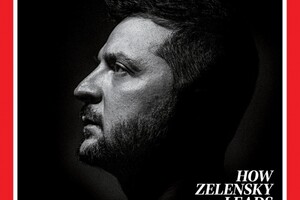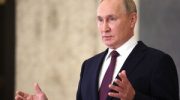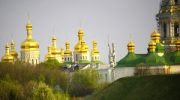The magazine published an article about the Ukrainian president.

President of Ukraine Volodymyr Zelensky appeared on < strong> Time magazine covers . The publication published an article about the Ukrainian president entitled “Inside the world of Zelensky.” The author of the article, Simon Schuster, said he saw it in two weeks in April at the president's office.
beside him. On the phone screen, his face looks like a ghost in the dark, and his eyes scan for messages he hasn't been able to read during the day. Some from his wife and children, many from advisers, some from the military, surrounded in basements, who repeatedly ask him for more weapons to break through the Russian siege, “the newspaper writes.
“In his own bunker, the president has a habit of reviewing his agenda every day, even when the day ends. He lies without sleep and thinks whether he missed something or forgot someone.
“This is nonsense,” Volodymyr Zelensky told me at his presidential residence in Kyiv. “It's the same agenda. I see that everything is done today. But I look at him several times and I feel that something is wrong. ” No anxiety keeps him from closing his eyes. “My conscience torments me.” The same thought kept running through his head: “I allowed myself to sleep, but now what? Something is happening now. ” Somewhere in Ukraine, bombs are still falling. Civilians are still trapped in basements or under rubble. Russians still commit war crimes, rape and torture. Their bombs destroy entire cities. The city of Mariupol and its last defenders are under siege. A critical battle has begun in the east, “the article reads.
“Zelensky told me:” People see this war on Instagram, on social networks. When they get tired of it, the war will disappear from their sight. ” This is human nature. Horror has a way of making us close our eyes. “It's a lot of blood,” he explains. “It's a lot of emotions.” Zelensky feels that the world's attention is diminishing, and this worries him almost as much as the Russian bombs. Most evenings, when he reviews his agenda, his to-do list is not so much about the war itself as it is about how it is perceived. Its mission is to make the free world experience this war as Ukraine experiences it: as a matter of its own survival. He seems to be succeeding. The United States and Europe rushed to his aid, providing more weapons to Ukraine than to any other country since World War II. Thousands of journalists came to Kyiv to fill their employees' e-mails with interview requests, “said Simon Schuster.
Simon Schuster spent two weeks in the President's Office.
“This experience has shown how much Zelensky has changed since our first meeting three years ago, behind the scenes of his comedy show in Kyiv, when he was still an actor running for president. His sense of humor has not disappeared. “It's a means of survival,” he says. But two months of war made him tougher, more irritable and more at risk. Images of dead civilians haunt him. Similarly, the daily appeals of his troops, hundreds of whom are trapped underground, are running out of food, water and ammunition, “the author writes.
“On the day of our last meeting on the 55th day of the invasion, Zelensky announced the beginning of a battle that could end the war. Russian troops regrouped, suffering heavy losses around Kyiv, and launched a new offensive in the east. There, says Zelensky, the armies of one side or another are likely to be destroyed. “It will be a full-scale battle, bigger than any we have seen in Ukraine,” Zelensky told me on April 19. “If we survive,” he says, “it will be a crucial moment for us.” The turning point, “said Simon Schuster.
“American and British troops have offered to evacuate the president and his team. The idea was to help them form a government in exile, most likely in eastern Poland, which could continue to rule the country at a distance. None of Zelensky's advisers recalls taking these proposals seriously. Speaking with the United States on a secure telephone line, he responded with a vivid phrase that hit headlines around the world: “I need ammunition, not a taxi.”
“We thought it was bold,” he said. an American official informed of the call. “But it's very risky.” Zelensky's bodyguards felt the same. They also urged him to leave the office immediately. The office buildings are located in a densely populated area, surrounded by private houses that could serve as ambushes for enemy snipers. Some houses are close enough to throw a grenade out the window across the street, “the article reads.
“Somewhere outside the capital, a safe bunker was waiting for the president, equipped to withstand a long siege. Zelensky refused to go there. Instead, during the second night of the invasion, when Ukrainian troops were fighting Russians in the surrounding streets, the president decided to go out into the yard and film a video call to his phone. “We are all here,” Zelensky said after a “roll call” of officials standing nearby. They wore army green T-shirts and jackets, which became their military uniform. “Defending our independence, our country.”
At that time, Zelensky understood his role in this war. The eyes of his people and most of the world were fixed on him. “You know what they're watching,” he says. “You are a symbol. We need to act as the head of state should act, “the newspaper writes.
“People often ask who Zelensky's speechwriter is,” said Dasha Zarivna, a communications adviser. “The main speechwriter is himself,” she says. “He works on every line.” During March and early April, Zelensky delivered an average of about one speech a day, speaking at various venues, such as the South Korean parliament, the World Bank, and the Grammy Awards. Each speech was created with the audience in mind. When he addressed the US Congress, he mentioned Pearl Harbor and September 11. The German parliament listened to references to the history of the Holocaust and the Berlin Wall, “the author said.
In early April, the team began to leave the bunker much more often. Ukrainian troops repulsed the enemy from the outskirts of Kiev, and the Russians marched east. On the 40th day of the invasion, Zelensky made another trip outside the office, this time with cameras. That morning, he marched in a convoy of armored vehicles to Bucha, where Russian troops killed hundreds of civilians.
Zelensky and his team still spent most nights and some meetings in the bunker. But the retreat of the Russians allowed them to work in their usual offices. One obvious difference was the darkness. Many windows were closed with sandbags. The lights have been turned off to make it more difficult for enemy snipers.
“Fatalism functioned as an organizing principle. Some rough precautions – barricaded gates, bulletproof vests – were necessary at the beginning of the war. Later, when there was no risk of Russian military infiltration, Zelensky's team realized that such a defense was ultimately futile. They encountered an invader with a nuclear arsenal. They decided not to run away. What was the point of hiding? ”The article reads.
For more than a month, Zelensky talked to two Ukrainian commanders. They were the last defenders of Mariupol, a city of half a million that the Russians surrounded at the beginning of the invasion. A small force is still kept inside the huge steel plant. One of their leaders, Serhiy Volynsky, a major in the 36th Separate Marine Brigade, kept in touch with Zelensky for weeks. “We already know each other well,” Zelensky told me. Most days they call each other or send messages, sometimes in the middle of the night. Earlier, the soldier sent the president a selfie, which they took together long before the invasion. “We even hug there like friends,” he says.
Read also: Zelensky was invited to the G20 summit
In almost every conversation with foreign leaders, Zelensky asks for weapons that can help equalize the odds. Some countries, such as the United States, the United Kingdom and the Netherlands, have agreed to provide it. Others began to hesitate, especially the Germans. “The situation with the Germans is really difficult,” says Zelensky. “They are behaving as if they do not want to lose relations with Russia.” Germany relies heavily on natural gas supplies to Russia. “This is their German pragmatism,” says Zelensky. “But it costs us a lot.”
“Ukraine has clearly expressed its disappointment. In mid-April, German President Frank-Walter Steinmeier was about to visit Kyiv when Zelensky's team asked him not to come. Sometimes the president's outspokenness may seem insulting, for example, when he told the UN Security Council that it should consider self-dissolution. German Chancellor Olaf Scholz told me that he would be grateful if Steinmeier was invited to Kyiv “as a friend.” But Zelensky realized that friendly inquiries would not give Ukraine the weapons it needed. This is how Zelensky understands his main responsibility. Not as a military strategist, authorized to move battalions on the map, but as a communicator, a living symbol of the state, whose ability to capture and hold the world's attention will help determine whether his nation lives or dies, “the newspaper writes.
“I may have been lucky enough to meet with the president at the end of a very long day. Almost two months after the invasion, he changed. New wrinkles appeared on his face, and he no longer looked for his advisers in the office, pondering the answer to the question. “I became a senior,” he admitted. “I have grown old from all this wisdom, which I never wanted. This is the wisdom of the death toll and torture of Russian soldiers. Such wisdom, – he added. “Honestly, I never intended to gain that kind of knowledge.”
It made me wonder if he regretted the choice he made three years ago, around the time we first met. His comedy show was a hit. Standing in his dressing room, he still glowed with admiration from the crowd. Friends waited behind the scenes to start the party. Fans gathered on the street to take pictures with him. It was only three months after his candidacy for president, when it was not too late for Zelensky to turn things around.
But he does not regret his choice, even in the face of war. “Not for a second,” he told me at the presidential residence. He does not know how the war will end and how history will describe his place in it. At present, he only knows that Ukraine needs a wartime president. And that's exactly the role he's going to play, “sums up Simon Schuster.


